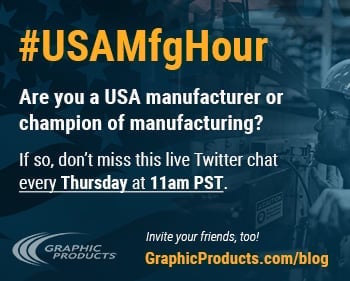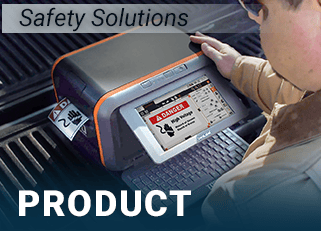How to Grow Credibility as an Industry Leader
03
February,
2023
8 MINUTE READ

Ads, emails, competition ? there's much to grab at your ideal client's attention. Yet, attracting attention and keeping it are two different ideals. Paul Kiesche of Aviate Creative, a branding and creative agency with an edge in manufacturing, in New Jersey, leads a chat on growing credibility as an industry leader for the #USAMfgHour chat on Twitter.
Productive Paths
Credibility is a true mark of success. It requires a balance of traditional marketing concepts as well as soft skills, which then creates a type of powerful currency. When industries look to work with a manufacturer, some key factors help build trust and a working relationship.
Which industry do you want to become more credible in? (Hint: Where are your ideal customers?)
"That's a toughie because we're in EVERY industry, but I think water/wastewater is where we'd like to be most credible," said Rebecca Hart of Drive Source International/Dynamatic in Wisconsin.
"Manufacturing and software, tourism and retail. SMB sector," said Nigel T. Packer of PelaTis in Wales, UK.
"Medical Devices," said Shannon Simpson of DuraTech Industries in Ohio.
"Our clients come from all industries so that's a difficult one to answer. I would say our ideal customers are large companies because they require more automation and custom equipment," said Sherri Darby of WiscoLift in Wisconsin.
"Industrial Manufacturing because that is what we specialize in (for marketing)," said StratMg marketing in Illinois.
"NJ Manufacturing is our space. Our CEO John W. Kennedy has made an incredible name for himself in New Jersey's local manufacturing industry. I'd like to help more of NJMEP's subject matter experts do the same. We're all working toward the same goal," said Mike Womack of NJMEP.org, a manufacturing extension program.
"Other manufacturers. I know it's broad but only having 280 characters to describe our wide range of customers would be quite the task. We serve companies that produce steel to grind shops to woodshops and just about everything in between," said Ben Nordman of Obsidian Manufacturing in Illinois.
"It's tough because the software has value for a bunch of different industries. Manufacturing is a huge one though! As is Field Service, Construction, and Contracting work," said Julianne Schaub of Striven in New Jersey.
"We target distributors and manufacturers from $12M to $150M in revenues. I like the Industrial segment because I have spent my entire career there," said Phil Samuels of Intuilize.
"We provide healthcare, pharmacy, and technology manufacturers/suppliers with innovative financing solutions for their customers. Device manufacturers of new and emerging technologies are the most challenging for us to reach," said Americorp Financial in Michigan.
"Manufacturing! Specifically automotive, F&B, pharma, & CPG," said John Buglino of Optessa in New Jersey.
"Infrared optics! We've built up our capabilities to coat a variety of substrates in the infrared spectrum, but would love more exposure in that area," said North American Coating Laboratories in Ohio.
"Many companies grow credibility within their industry (i.e. manufacturers in manufacturing). However, that may not achieve your goals. If your goal is sales, it's more effective for you to pick a narrow niche industry where your target market is," said Kiesche.
What are some advantages of building credibility within your target industry?
"If you're a credible source, people will tend to pay less attention to price and will work with you because of the trust you've built and maintained," said DSI/Dynamatic.
"Building credibility within your industry leads to you becoming a credible voice in your industry which opens doors for higher-level networking and an expanding customer base," said Carita Hyman of 360 Outcome in North Carolina.
"I think it's important to know what you are selling and important to provide advice that's backed by experience and knowledge," said Kirsten Austin of DCSC warehouse software solutions in Missouri.
"The added credibility makes it easier to sell your products in the end. If a customer or potential customer sees or thinks you may not know your own products, there's most likely not going to be a sale," said Obsidian.
"Not only is it great for fostering relationships and giving the Striven more opportunities to improve our product and services but building credibility builds trust, which can lead to more opportunities to connect with others," said Striven.
"Expanding your client base and receiving referrals within your target industry," said WiscoLift.
"With credibility comes recommendations. "And so, it begins" is at the start of every relationship," said Nick Rivers of Obsidian Manufacturing.
"Having your ideal client find you," said Buglino.
Gail Robertson of GailNOW marketing in Canada concurred and added that "social media is a way to pull people in instead of pushing out what you want to sell."
"The biggest advantage I see is transparency. Customers and leads what to know that they are doing business with a person and company that is knowledgeable, trustworthy, and dependable. Also, thought leadership in an individual helps humanize a company brand," said Sue Nordman of Obsidian Manufacturing.
"Establishing thought leadership helps keep us top of mind with prospective clients," said Samuels.
"It's like playing that telephone game as a kid. One person tells another person and that person tells another, etc.," said Megan Murphy of SpaceGuard Products in Indiana.
"You become a trusted resource! Demonstrating expertise and gaining credibility leads to higher referrals and increased revenues. Plus people reach out with really fun questions because you're the expert! We love getting fun optical questions!" said NACL.
"The biggest advantage would be knowing the lingo and being able to speak their language. Along with industry knowledge and knowing how the industry functions," said Dan Bigger of Custom Profile plastic profile solutions in South Carolina.
"Staying top of mind and positioning your organization as the 'subject-matter expert' in your field by educating and sharing information that benefits them, so when your ideal customer needs your solutions, they use you! And know exactly what you do and how you do it!" said StratMg.
According to Kiesche, some advantages of building credibility are:
- Improving your reputation
- More exposure & brand awareness
- Easier and higher sales
- Increase your pricing
- Fame & being sought after
- Leadership
- Respect and trust
How can you gain insight and learn about your target industry?
"I always am reading blogs, talking to people, listening to podcasts like @MFGTalkRadio, and talking to my clients. It's important to keep your knowledge fresh," said DCSC.
"Be where they are. Tradeshows, social media, print advertising, even print marketing. Find them and be with them. Hang out where they hang out so you can chat and build relationships," said DSI/Dynamatic.
"Connect, read, listen, pay attention. All of those things in different specific aspects can lead to information gathering of the target industry," said Obsidian.
"For starters: Study the client base you have and then look on social media to connect with other companies like your client base. Study who is doing business with your competition and make connections," said Rivers.
"Read publications, join groups on social media, create relationships with those in that industry. Meet with industry leaders. Listen," said DuraTech.
"Attend webinars, be active in industry associations, research, questions," said Samuels.
"Active listening on social media! Take in what folks in those industries are looking for and what they want to improve and take that to your product. Develop and present solutions that matter to them and their specific needs!" said Striven.
"Reach out to those people in your target industry by Phone, In-Person, Email, Social Media. Be a good listener and make the goal to assist in their operational challenges rather than trying to sell the newest equipment," said WiscoLift.
"Attend tradeshows, figure out keywords associated with that particular industry and google them, learn some details of the products, ask your colleagues if they can introduce you to anyone they may know, join social media groups on that industry," said SpaceGuard.
"Research companies in the industry to determine offerings. Research customer base - determine what is lacking or what the biggest problem is. Then position yourself to solve it," said David Roppo, a management coach and consultant in Pennsylvania.
"Throw yourself in the mix. Be where your target industry is! Tradeshows, social media including chats, professional organizations - just about anywhere your target can see you. Network and form relationships. Also being where your competitors are helps," said Sue Nordman.
"Websites, LinkedIn, networking groups, networking events, manufacturing or trade websites or journals," said Bigger.
"Study the marketplace. You should know your customers. Have regular conversations with them. Listen to what they are saying. Read widely not just the target markets. Be knowledgeable to support your customers," said Packer.
"Webinars, follow and connect with thought leaders on social media, subscribe to newsletters, look at market reports, and when all else fails, guess and hope for the best," said NACL.
"Utilize the Search + Advanced Search via social media platforms," said Buglino.
To gain insight & learn about your target industry, Kiesche recommends trying:
- Asking questions, listening & Conversing with customers
- Interview prospects & experts
- Participate in events, podcasts & webinars
- Join associations & volunteer
- Research
- Create personas
"If you interview your prospects, it may naturally turn into a sales opportunity. It also gives you more credibility to quote your audience rather than it just being your word," said Kiesche.
Know Your Audience
What are some important things to know about your target audience?
"What problems we can solve for them, what we can do for them to help their business run better, what is the best way to interact with them to assist," said Julie Basello of Radwell International in New Jersey.
"There are some consistent challenges like the workforce issue/skills gap. However, each manufacturing operation has its unique challenges and bottlenecks as well," said NJMEP.
"How do they get their information? Where are they located? What problems do they need resolved? How do we need to talk to them? Who are they? (Demographics)," said DSI/Dynamatic.
"For one, what are their concerns, or problems," said DuraTech. "What do they value? What is important to them? Why would they want to change and work with you?"
"Their challenges. What will make their job easier? The size of their business; annual earnings," said WiscoLift.
"Great question. I would think by figuring out when they typically make purchases, so you create content months before, so when they are researching, your company pops up in a search," said SpaceGuard.
"Basics include demographic information (age, gender, job title, education level, generic/universal info). More advanced includes the type of language and content they consume and what channels they consume it from," said NACL.
"Understand what their pain points are," said StratMg.
"My first thought is to know how they want to communicate, then investigate (questions) how we might connect. After that, I need to find out what their real needs are," said Rivers.
According to Kiesche, manufacturers should learn their target audience's:
- Pain points & concerns
- What they care about & think is important
- Hot topics they are discussing
- Specific vocabulary they use
- Groups to which they belong
- Events they attend
- What they view, listen to and read
How can you educate your target audience and demonstrate your experience and knowledge?
"Webinars, Whitepapers, Blogs, Newsletters, and other of course," said WiscoLift.
"Blogs, newsletters, email campaigns, start and run a podcast that provides value, don't just post content that is self-serving - provide value - communicate well and LISTEN well too," said Radwell.
"You market your white papers, blogs, podcasts, hosting events, plant tours, virtual events, customer surveys/feedback, and videos," said Bigger.
"Put yourself in channels where you can be in front of that target! Share the information they need without expecting them to give you anything in return (controversial, but we don't believe in gated content). Also, consistency is key!" said NACL.
"By providing educational information to them that demonstrates your knowledge about their pain - and how you can help solve it for them," said Ruby Rusine of Social Success Marketing in California.
You can educate & show your expertise by:
- Helping
- Sharing solutions to challenges
- Informing
- Entertaining
- Engaging & participating
- Become part of the community
- Sharing advice, techniques & ideas
- Run events, chats, or mastermind
"It's important not to sell or self promote in your content. If your audience gets a whiff of marketing or sales you may lose them for good," said Kiesche.

What is some effective content you can share with your target audience?
"All of it! Really! We share all of our content, just not all at once. It depends on where we want to put our focus. Videos, blogs, graphic posts, animations, links to our site, links to general mfg news, etc. It's all effective to someone," said DSI/Dynamatic.
"Share your wins, Nobody does this and I have no idea why. Celebrate your team. Show your customers who you are. Birthdays, weddings (Rebecca & J5), hirings, anniversaries, and so on," said Bigger.
"Success Stories are my favorite! Even when they don't end in a sale. I know we are all here to make money, but helping people along that path is so gratifying," said Rivers.
"Look into what they are searching for and provide them with answers! Google Analytics and Search Console can be your best friend in developing content themes. Once you know the content you want to share, then you put it in a format that they want it in," said NACL. "This also helps you to prioritize content generation, especially when your company serves a variety of industries!"
Some effective content you can share:
- Social posts
- Share existing content & resources
- Writing Articles
- Case studies
- White papers
- Industry page on site
- Podcasting
- Lectures
- Videos
- Webinars
- Infographics
Build, maintain and improve your business' credibility and make it a mission to continuously strengthen your success in manufacturing.
About #USAMfgHour
Anyone who champions U.S. manufacturing can join in on a new conversation each week on Twitter using the hashtag #USAMfgHour. The chat starts at 11 a.m. Pacific Standard Time/2 p.m. Eastern. Share positive blog posts, helpful articles, news, important information, accomplishments, events, and more with other manufacturers and supporters from throughout the country.
Are you interested in hosting a #USAMfgHour chat? Contact organizers @CVTPlastics, @DCSCinc, and @SocialSMktg.
RELATED RESOURCES

The New Realities of Virtual Events
In the past year, businesses have had to let go of traditional tradeshows and other in-person events. Virtual ...
Read
Legendary Leadership Blueprint for Manufacturers
The leadership of yesterday is not working for tomorrow's generation. How can leadership evolve and progress ...
Read
Generating Quality Leads in Manufacturing
Finding the right leads for your business can be time-consuming and, sometimes, lead to nowhere. ...
Read.png)


